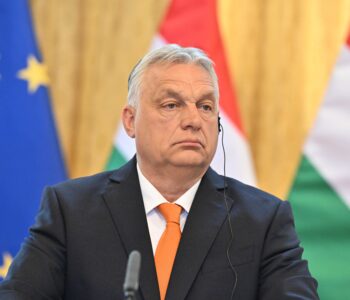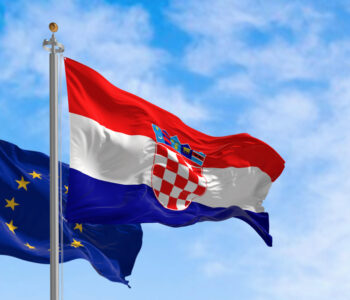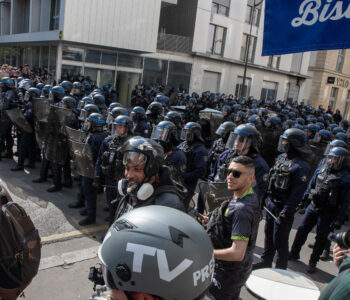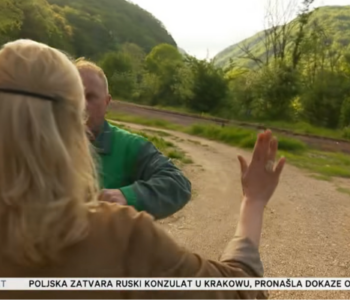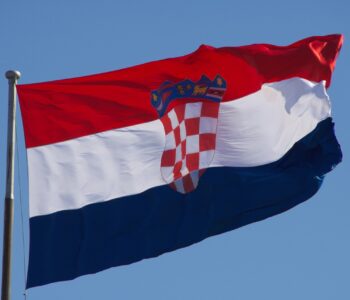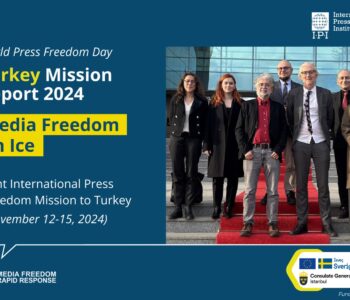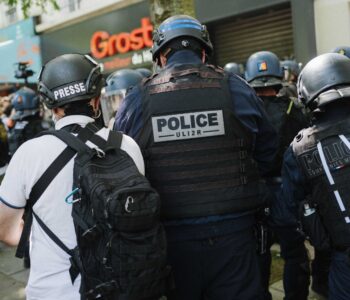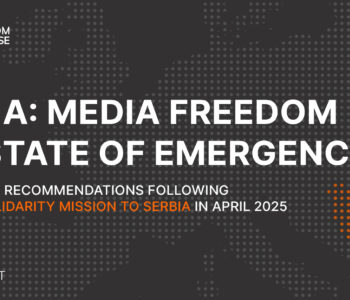On April 22, outgoing President Salomè Zourabichvili dedicated a tweet to Mzia Amaghlobeli’s 100 days in prison. The journalist was on hunger strike for about a month, then stopped at the request of the many who support and await her.
The arrest and ongoing trial of Amaghlobeli, founder of the independent media outlets Batumelebi and Netgazeti, are the tip of the iceberg of the ongoing repression against the media in Georgia. Amaghlobeli was arrested on January 12, 2025, during a protest in Batumi, after posting a sticker with the words “Georgia Strikes” on the fence of the Police Department in Adjara.
She is charged under Article 353 of the Criminal Code for alleged assault on a police officer, a charge that carries a prison sentence of four to seven years.
Discrepancies emerged regarding the circumstances of her arrest: Amaghlobeli was arrested by Grigol Beselia, the head of the Adjara police, but the report was signed by Gocha Vanadze, a sanctioned official.
During her court appearance, Amaghlobeli denied all charges. The court proceedings were repeatedly adjourned, as the defence presented new evidence and the judge was called off. Her defence team criticised the proceedings, pointing out inconsistencies in the detention report and questioning the qualifications of the presiding judge.
The international community has expressed concern over Amaghlobeli’s detention. Her case has attracted diplomatic attention, with observers from the Czech Republic, Sweden, Poland and the United Kingdom attending her hearings.
US Congressman Joe Wilson called for her immediate release, saying: “Mzia Amaghlobeli and all political prisoners of the Ivanishvili regime must be released immediately!”. The European Union spokesperson for foreign and security policy, Anitta Hipper, also criticised the crackdown on peaceful protesters, including the arrests of journalists and activists.
In addition to the demonstrations on Rustaveli Avenue that never fail to commemorate Amaghlobeli’s battle, Georgian journalists rallied in Kutaisi on March 21, marking Georgian Journalists’ Day.
Escalating media repression
Amaghlobeli’s case is emblematic of a broader trend of media repression in Georgia. Since November 28, 2024, the Committee to Protect Journalists (CPJ) has documented numerous incidents of police violence and arrests against journalists involved in protests.
Many journalists have been beaten, including Guram Rogava, a Formula TV journalist who suffered facial fractures, and Aleksandre Keshelashvili, a Publika journalist who was beaten and held for hours before receiving medical attention.
Indigo online magazine journalist Saba Sordia, who was held for 48 hours on April 7 on charges of disobeying police orders, reported that he had been subjected to homophobic abuse and threats by the officers. On April 18, the Tbilisi City Court fined Sordia 2,500 Georgian lari, or about 800 Euros. Sordia has maintained his innocence and is now appealing the fine.
In addition to physical assaults, the journalists have faced legal consequences. Formula TV journalist Nano Chakvetadze was fined GL5,000 (about 1,600 Euros) for allegedly blocking a road during her reporting.
Similarly, Aleksandre Keshelashvili received a verbal warning from the Tbilisi City Court for disobeying police orders. TV Pirveli cameraman Lasha Jioshvili was charged for a social media post in which he allegedly insulted law enforcement officers.
These incidents, compounded by fines and administrative penalties, highlight how state mechanisms are increasingly being used to intimidate media workers.
The Center for Media, Information and Social Studies (CMIS) reported that as of November 28, 2024, 124 incidents involving 147 journalists, photographers and cameramen have occurred, resulting in repression, including physical injuries, damage to equipment, fines and legal proceedings. CMIS stressed that the police fined 17 journalists a total of five thousand lari for alleged roadblocks and detected a series of interferences with the work of the media, including verbal and physical abuse and confiscation of equipment.
Controversies on the Georgian public broadcaster
Georgia’s state-run television station, GPB, remains at the centre of the media controversy that has accompanied months of ongoing protests. Frustration escalated on March 12, when students from the University of Theatre and Film demonstrated outside the station, demanding equal airtime after accusing their dean of spreading misinformation during an appearance on GPB.
Slogans such as “Airtime for students, solidarity for students” rang out outside the studio, following the earlier suspension of several student protesters.
GPB’s management has been criticised for its handling of such demands and for alleged bias in its coverage. Tensions escalated with the re-election of Vasil Maghlaperidze as chairman of the board on April 3, without any alternative candidates being considered.
Protesters gathered outside GPB’s headquarters, unfurling banners reading “People deserve an independent public broadcaster.” GPB does not command the lion’s share of the country’s privately owned broadcasting, but because it is public, its role is scrutinised differently in a highly polarised broadcasting environment.
On April 12, monitoring chief Tea Kakhiani and actor Davit Velijanashvili announced their resignation, arguing that the management was suppressing independent voices and fostering a culture in which free-thinking professionals were not welcome. Their resignations followed those of Nino Zautashvili and Vasil Ivanov-Chikovani, figures known for their integrity.
These developments fuel growing concerns that the state TV situation is exacerbating Georgia’s democratic decline amid growing authoritarian tendencies.
 Allgemein
Allgemein





